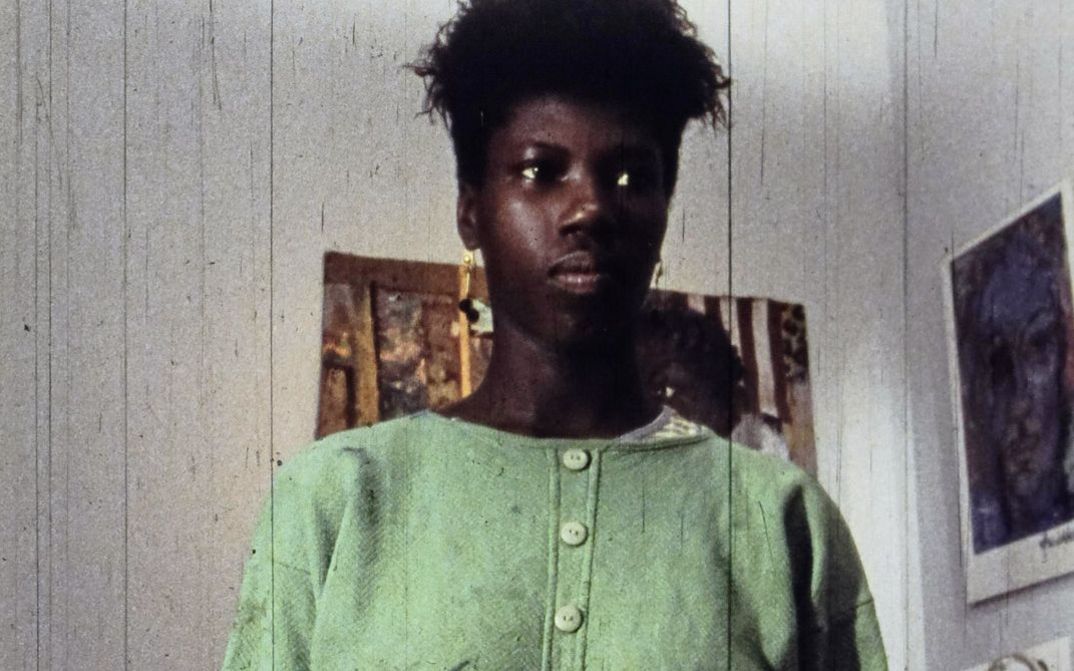Fiktionsbescheinung Program 6

Sat 18.02.
19:30
Cinema
Akademie der Künste
The „Fiktionsbescheinigung“ explores the question of how culture in general and cinema in particular are related to society and racism. It is dedicated to the work of Black directors and directors of colour in Germany and sees itself as an experiment in shared curatorial responsibility that also seeks to shine a spotlight on a chapter of German film production that has been unfairly neglected.
The film selection was put together by curators Karina Griffith, Jacqueline Nsiah and Can Sungu, supported by Enoka Ayemba and Biene Pilavci and the Berlinale Forum selection committee.
Director
Wanjiru Kinyanjui
Federal Republic of Germany / 1988
10 min.
/ 16 mm
/ Original version
Original language
English
A young Black woman played by Alida Babel walks through Berlin on her own. It is midnight, her heels click against the steps leading down to the U-Bahn, the train has just left, the empty platform becomes a space of anxiety. Twelve minutes to wait, the voiceover spoken by the director herself complains: “This impatience!”
Wanjiru Kinyanjui made A LOVER & KILLER OF COLOUR (1988) during her studies at the DFFB. This short film miniature revolves around the experience of sexist and racist harassment – and the anger which emerges in response. What can be done with all the aggression that finds no release during such humiliating moments? The film watches as rage is translated into artistic work. The night scenes alternate with footage from the young woman’s studio; she is a painter, and she writes. While she is typing, the voiceover says: “If you do not stop / insulting me / you leeches / I will kill you / in this poem.” Wanjiru Kinyanjui’s directness rejects the sort of sublimation that may have kept the anger contained – even as the wish for reconciliation remains: “Through words, my trust is repaired / on white paper”. (Cristina Nord)
Director
Wanjiru Kinyanjui
Germany / 1995
82 min.
/ 35 mm
/ Original version with English subtitles
Original language
English, Swahili
Watching Wanjiru Kinyanjui's feature film DER KAMPF UM DEN HEILIGEN BAUM, one would never guess that it was the director’s graduation project from the DFFB. It displays a wit and self-assurance rarely seen in student films. It was also shot far from Berlin, in a Kenyan village with Kenyan actors. The film was based on a short story by the best-selling author Barbara Kimenye. The dialogue alternates between English and Kiswahili, and the soundtrack is by a Senegalese musician called Mamadou Mbaye.
Protagonist Mumbi leaves Nairobi and her abusive husband for her ancestral village. There she clashes with a Christian women's group, whose members are determined to eradicate every last trace of pre-colonial beliefs. They are particularly vexed by a magnificent tree, because the villagers believe it possesses supernatural powers. A cunning mayor and an amorous tailor leap to Mumbi's defence, and in the end it is ants that engineer what Ngũgĩ wa Thiong’o, the doyen of Kenyan literature, once referred to as "Decolonising the Mind". (Cristina Nord)